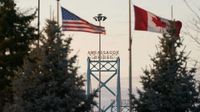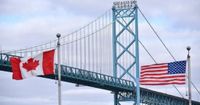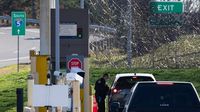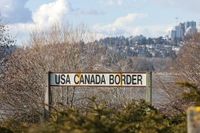The Government of Canada has issued a stark warning for its citizens planning to travel to the United States, advising them to brace for heightened scrutiny at border entry and exit points. In an updated travel advisory released on April 4, 2025, Canadians are urged to be forthcoming with U.S. border authorities and to expect rigorous checks, including the potential search of electronic devices.
The advisory highlights that individual border agents possess significant discretion in determining entry and exit requirements, which means travelers could face unexpected challenges. “Expect scrutiny at ports of entry, including of electronic devices,” the advisory states. This warning comes amidst rising tensions between the two nations, particularly following U.S. President Donald Trump’s imposition of tariffs on Canadian goods, which has led to a notable decline in cross-border travel.
Statistics from the B.C. Ministry of Transportation reveal a sharp drop in vehicle crossings at the Peace Arch border. On March 17 and March 24 of this year, just over 3,300 vehicles crossed into the U.S., a stark contrast to more than 10,100 during the same days in 2024. This decline reflects growing apprehension among Canadians about traveling south, fueled by fears of potential detainment and the political climate.
In addition to the scrutiny, the Canadian government has also emphasized that if travelers are denied entry, they could face detention while awaiting deportation. The advisory reads, “If you are denied entry, you could be detained while awaiting deportation.” This warning is crucial as it underscores the serious implications of not meeting U.S. entry requirements.
Starting April 11, 2025, new regulations will require Canadians and other foreign nationals planning to stay in the U.S. for more than 30 days to register with U.S. authorities. Failure to comply could result in penalties, fines, or even misdemeanor prosecution. This requirement primarily affects those entering the U.S. at land border crossings, as air travelers typically receive an I-94 admission form upon arrival.
Ottawa has reiterated the importance of being prepared to show proof of legal status in the U.S. at any time. “Authorities may request proof of legal status in the U.S. at any time,” the advisory warns, stressing that travelers should ensure they have the necessary documentation readily available.
Despite the low-risk rating assigned by the Canadian government for travel to the U.S., many Canadians remain wary. The recent experience of a B.C. woman who was detained at the U.S. border and held in inhumane conditions for two weeks has added to these concerns. Following her detention, she was eventually returned to Canada, but her story has left many travelers apprehensive about crossing the border.
In light of these developments, the Canadian government is urging travelers to be upfront with border authorities about their reasons for entering the U.S. This proactive approach is intended to minimize the risk of complications during the border crossing process.
Additionally, the advisory warns that U.S. Customs and Border Protection (CBP) agents have the authority to search travelers’ electronic devices without needing to provide a reason. This includes the ability to demand passwords to unlock devices during inspections. Travelers who refuse to comply with such requests risk having their electronics confiscated and may face significant delays.
To mitigate the risks associated with device searches, the advisory suggests that travelers place their devices in airplane mode before crossing the border to prevent unintended downloads of remote files, which could complicate screenings.
The practice of searching electronic devices at the border has drawn criticism from civil liberties groups, who argue that it is invasive and infringes on personal privacy. The U.S. Supreme Court has upheld the authority of border agents to conduct warrantless device searches, citing the “border search exception” to the Fourth Amendment, which allows for such inspections without a warrant or probable cause.
In a notable incident, Dr. Rasha Alawieh, a Lebanese assistant professor at Brown University, was deported to Lebanon after U.S. agents discovered deleted photos of prominent political figures on her phone during a border inspection. The existence of these photos was revealed in a court filing, raising concerns about the implications of device searches and the potential consequences for travelers.
As Canadians navigate these new travel advisories, the government continues to emphasize the importance of understanding and complying with U.S. entry requirements. The evolving political landscape and the introduction of stricter border policies necessitate that travelers stay informed and prepared.
With the ongoing changes in U.S.-Canada relations and the increasing scrutiny at the border, Canadians are encouraged to monitor updates from the government and to verify information with foreign representatives in Canada. The situation remains fluid, and travelers should remain vigilant as they plan their trips south of the border.








